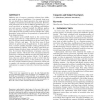Free Online Productivity Tools
i2Speak
i2Symbol
i2OCR
iTex2Img
iWeb2Print
iWeb2Shot
i2Type
iPdf2Split
iPdf2Merge
i2Bopomofo
i2Arabic
i2Style
i2Image
i2PDF
iLatex2Rtf
Sci2ools
110
click to vote
ASPLOS
2006
ACM
2006
ACM
Tradeoffs in fine-grained heap memory protection
Different uses of memory protection schemes have different needs in terms of granularity. For example, heap security can benefit from chunk separation (by using protected "padding" boundaries) and meta-data protection. However, such protection can be done at different granularity(eg. perword, per-block, or per-page), with different performance, cost and memory overhead tradeoffs for different applications. In this paper, we explore these tradeoffs for the purpose of heap security in order to discover whether the "right" granularity exists and how the granularity of protection affects design decisions. We evaluate such tradeoffs based on the current heapsecurity approaches in a single address space operating system.The access control granularities we use are word, 8-byte, 16-byte, 32-byte, and page. We find that none of these schemes is optimal across all applications. In some applications, excessive padding degrades caching performance for coarse-granularity scheme...
ASPLOS 2006 | Heap Security | Memory Protection | Memory Protection Schemes | Programming Languages |
| Added | 13 Oct 2010 |
| Updated | 13 Oct 2010 |
| Type | Conference |
| Year | 2006 |
| Where | ASPLOS |
| Authors | Jianli Shen, Guru Venkataramani, Milos Prvulovic |
Comments (0)

